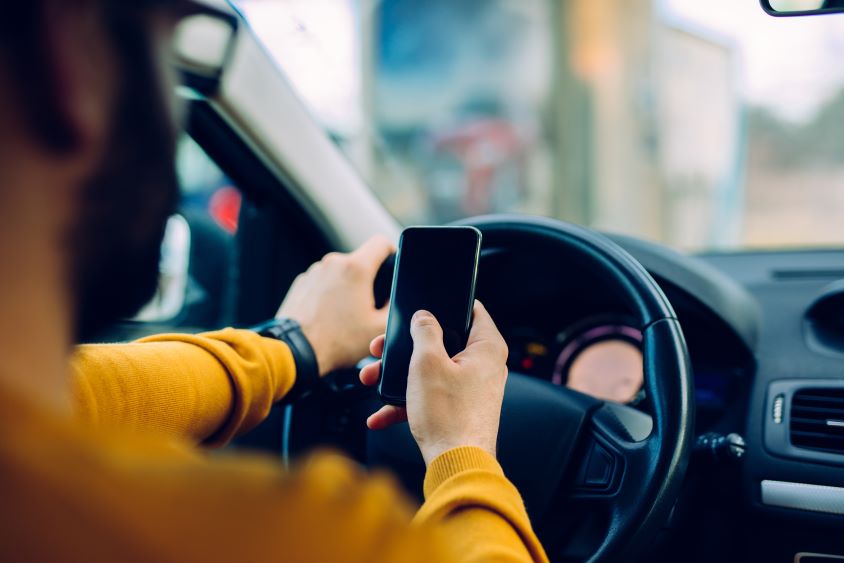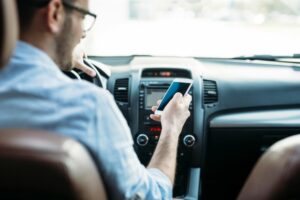How many of your drivers use their phones while driving?
Written by: Simon Pavey, Last updated:4th August 2021

As a fleet operator, you may be distressed by the idea that your drivers could be choosing to use their mobile phones while on the job rather than paying full attention to the road. After all, while multi-tasking is a great skill – we’re only human and simply do not have the ability to operate a vehicle while being fully alert to road dangers, and texting or making a phone call.
So, using a phone while driving is definitely a bad thing, but we all see drivers on their phones from time to time while we’re on the roads – meaning there are a bunch of potential issues to unpack here. There are questions around whether (and how) drivers actually use phones while driving, the legality of using a phone while driving, and how to approach this topic within your organisation. That’s exactly what we’re going to dive into in this article.
Mobile phone driving laws
The Department of Transport’s 2017 research found that as many as 445,000 drivers are using their phones while driving. Whether they realise it or not, this is simply not legal. In fact, it’s illegal to use any handheld mobile device while driving.
The relevant UK laws we can look to for guidance on the use of mobile devices while operating a vehicle are:
- The UK guidance on using a phone or sat nav while driving. This guidance advocates the use of a cradle for those in need of a mobile device while driving and outlines the conditions under which this is safe – including when using a Bluetooth headset or windscreen mount.
- The Crown Prosecution Service’s legal guidance on mobile phones & road traffic. This article helps provide clarity as to what can be defined as a handheld device, and what exactly constitutes driving.
It’s important that all drivers within a commercial fleet have accurate and up to date knowledge of these laws to protect both themselves and other road users from harm. To check whether this is a prominent issue amongst your drivers, you could look to have an honest conversation with them, or survey them to test grey areas that help you identify whether these laws are fully understood.
Here are some questions to help get you started:
Q: Is it legal to drive while texting?
A: No
Q: Is it legal to send texts while you’re waiting at a red light?
A: No. This applies even if your engine is turned off and the vehicle is stationary. The only exception to this is if you’re using hands free communications, which are permitted so long as they do not distract you from driving.
Q: Is it legal to plug your phone into your car and charge it while driving?
A: Also no.
Q: How can you take an urgent phone call when driving?
A: The correct way to do this is to pull over into a designated parking space, turn your engine off, apply the handbrake and remove the keys from the ignition.
All of these individual operations are still considered part of the driving, so a vehicle is not considered to be truly stationary in law until all of these operations have been completed. After this process has been completed, the more time that passes means it’s less likely the driver is considered to be actively driving.
What happens if you’re caught on your phone while driving?
It’s important to consider the potential implications of breaking these laws, both from a driver and company perspective.
For drivers
For drivers, there’s a risk of committing prosecutable offences directly related to using a mobile phone while driving. There are also separate offences around not being in full control of a vehicle – which can apply if the driver is deemed to have been distracted by a phone in a cradle.
If a police officer sees any such offence committed, prosecution will follow – and it will result in points added onto a driver’s licence and a fine, as well as potentially more serious ramifications based on the severity and impact of the offence.
If a driver is disqualified from driving as a result of these types of offences, they’ll find themselves unable to continue driving professionally.
For fleet operators
From a business perspective, there are practical issues associated with having your drivers disqualified. For example, it could generate a bad reputation for your business if such issues occur repeatedly and are picked up on by the media – which may impact your ability to secure contracts and bring new customers on board.
What’s more, there’s already a severe lorry driver shortage in the UK (as of August 2021) so recruiting new team members is likely to be challenging. A much better option, then, is to take steps now to improve driver safety and ensure laws are being followed by your employees.
How to encourage your drivers to put down their phones
So, what practical steps can you take to achieve this within your organisation?
- Have an open and honest conversation with your drivers about the laws. Look to test their understanding of the laws and educate them on best practice.
- Ensure that your employee contracts include clauses that explain what happens in situations whereby a driver has been found breaking the laws, including if it has resulted in an accident.
- Support your drivers with the right technology. While many modern vehicles have built-in Sat Navs and the likes, it’s important to make sure that your drivers have access to cradles or hands-free alternatives that prevent them from having to use their phones while driving.
One final thought is that it’s simply not worth looking for ways around the existing laws. Did you know, for example, that in event of a serious accident, the police have the right to access a phone and analyse its data to determine whether the device was being used at the time of an incident, and could have therefore caused the driver to lose control of their vehicle?
How could Fuel Card Services help?
At Fuel Card Services, we specialise in supporting drivers and fleets with the right technology. Our range of fleet services is designed to you access to:
- Advanced telematics – a fully customisable tracking system tailored to your fleet’s requirements that can improve safety for your drivers.
- MileageCount – an intelligent, automated system for accurately reporting mileage claims.
- DriversClub – our fast and free fuel-finder app that helps your drivers quickly locate their nearest fuel pump.
If you’re serious about bringing the right technology to your fleet, and saving costs both through tech and having the right fuel cards for your drivers, then contact our friendly experts to find out how we can support you.
back



